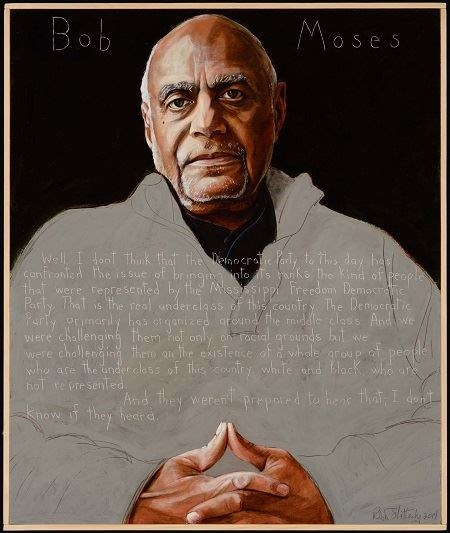 Bob MosesRobert Shetterly
Bob MosesRobert Shetterly
What is the common denominator between civil rights and algebra? The answer to the equation can be found in the name of one man, Robert Moses. An activist since the 1960s when he demanded political access for African-Americans by organizing voter registration drives in the South, Bob Moses focuses today on another fundamental civil right – economic access defined by math literacy. He wholeheartedly embraces the educational concept that all children can learn and that all children deserve the best education they can receive. To Bob Moses, it is all about removing barriers to learning, so disadvantaged youth can take advantage of new technologies and economic opportunity to experience workforce equality.
Why algebra? Moses strongly believes that for an individual to succeed in the 21st century, he or she must be proficient in math and science. Since the information highway has been paved with revolutionary advances in computer technology, and these indispensable tools are powered by mathematical symbolic languages, students need to become literate in math, the “hidden culture” of computers. Just like speaking a native language helps you to understand the people who speak it and find your way around a foreign country, so does the knowledge of a symbolic mathematical language help students to navigate the culture and terrain of computer technology, and algebra is the language in which students learn to manipulate these abstract symbols.
As a concerned parent and impassioned middle school mathematics teacher, first in New York and then in Tanzania, East Africa, Bob Moses speaks from experience. As often happens, the concept for The Algebra Project, which he founded to promote math literacy, grew out of a volunteer experience, in this case in his oldest daughter’s middle school class in the Open Program of the Martin Luther King, Jr. Elementary School in Cambridge, Massachusetts. While his daughter was proficient in the math being taught at school, he felt what she was learning was inadequate to prepare her for her future. So, he took action. At the teacher’s request, he worked with a small group of students. This small beginning multiplied into a movement in which his daughter's math teacher, the rest of the students and other parents became involved. The adage “Think globally, act locally" is exactly what took place in organizing a community around the teaching of algebra right where he lived. Three of Moses’ children caught the wave of his passion and have since joined him in The Algebra Project as teachers.
So, how does Bob Moses make abstract math interesting and intelligible to inner city children and children of the rural poor? The answer is subway rides, games, competitions, gumdrops, toothpicks, lemonade and everyday life experiences. His students do not sit passively in a classroom and memorize equations and formulas. Instead, they take field trips and measure distances and map their journey. They assign symbols to points of interest. They create models and pictures and write creatively about their experiences. From these physical events and familiar experiences, they construct mathematical concepts, using practical logic and abstract symbols.
The Algebra Project has become a model program for teaching math literacy. Its success can be measured in students' improved performance in math and in the number of students enrolling in college-prep math classes. Bob Moses' activism has brought the issue of math literacy front and center. Through the Algebra Project, he has raised awareness and united students, parents, teachers, and community members in the struggle to remove barriers to the fundamental civil rights of economic access and workforce equality.
Robert Moses is the recipient of numerous honors and awards, including the Heinz Award for the Human Condition, which seeks to honor those individuals who have created programs that protect and empower disadvantaged individuals. MY HERO celebrates Robert Moses, teacher and math literacy crusader, for his dedication to giving disadvantaged youth the opportunity to experience their economic potential in an increasingly technological society.
Page created on 1/30/2009 11:15:41 AM
Last edited 1/19/2021 5:19:47 AM
Staff, Edutopia. "Robert Moses : Math Maven." Edutopia. Nov Dec 2004. Volume I
Watson, Bruce. "A Freedom Summer Activist Becomes a Math Revolutionary." [Online] Available http://www.smithsonianmag.si.edu/smithsonian/issues96/feb96/moses.html. February 1996.
Moses, Robert. Radical Equations: Math Literacy and Civil Rights. Boston, Massachusetts: Beacon Press, 2001.
